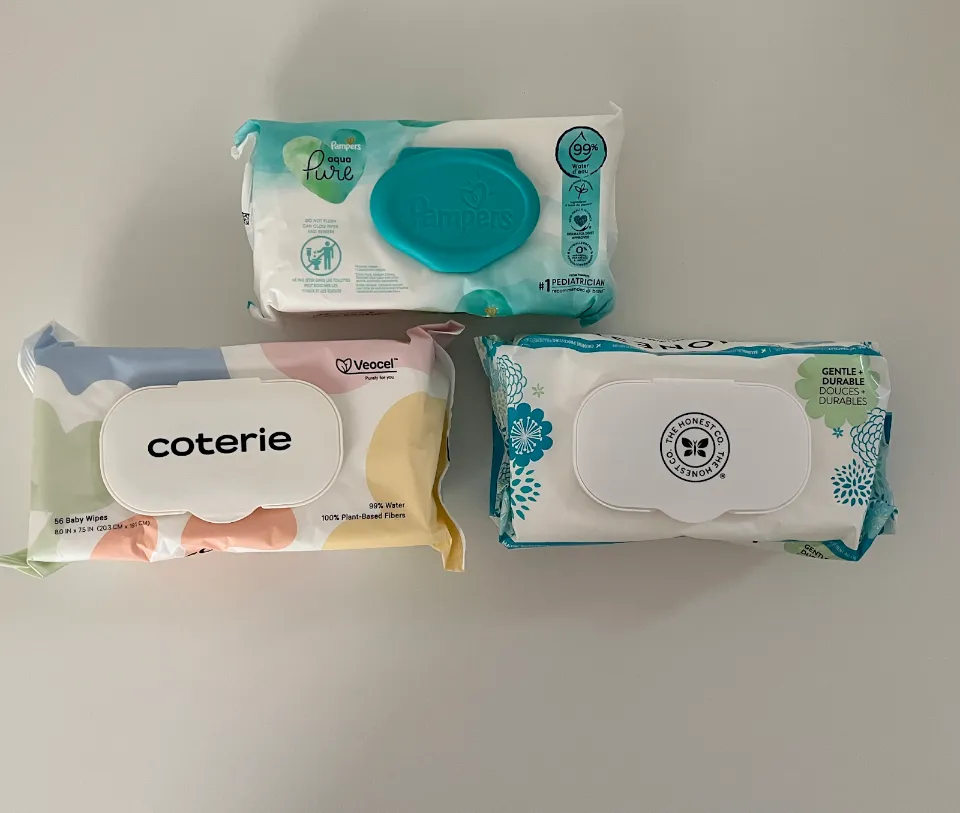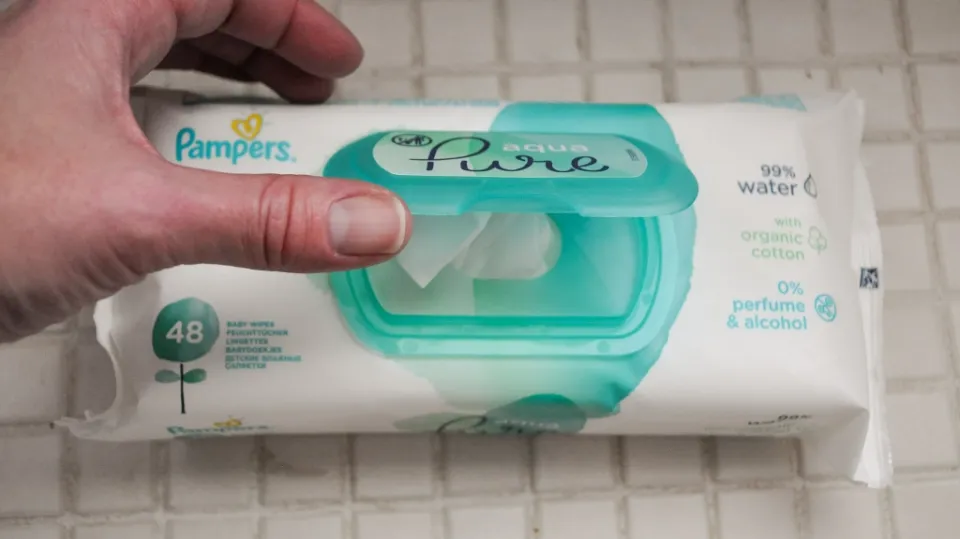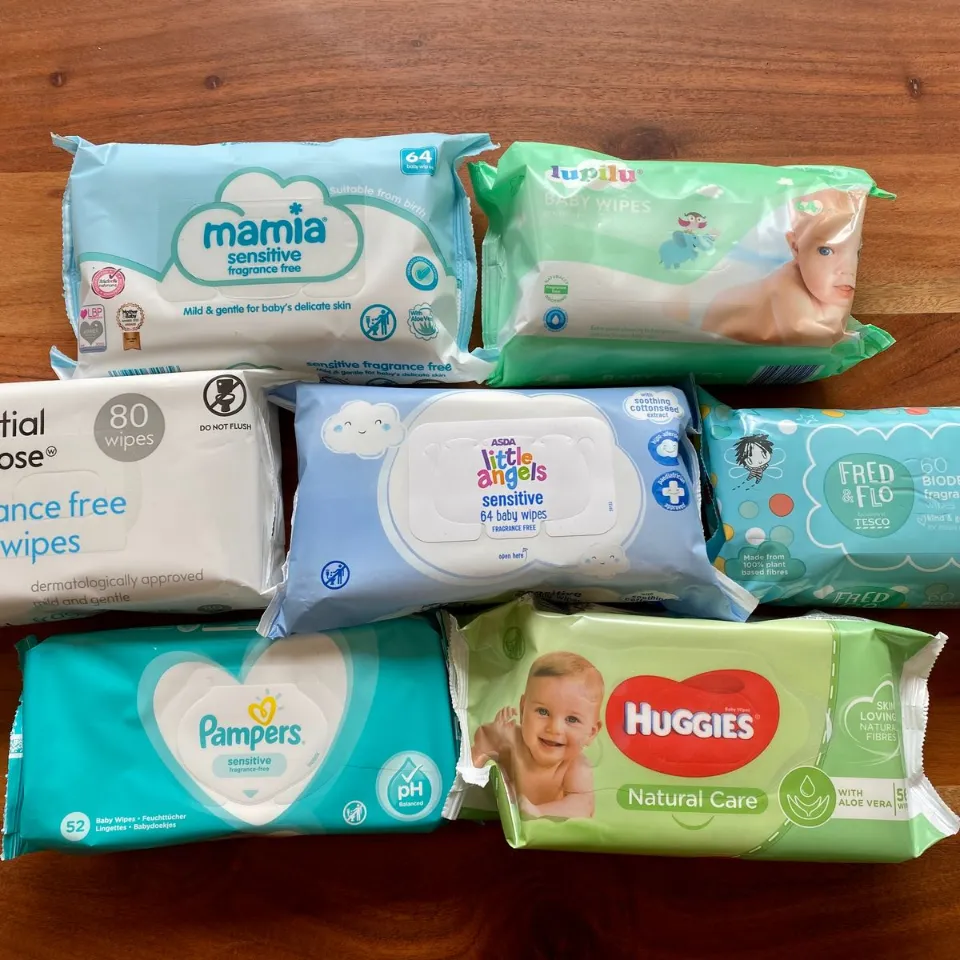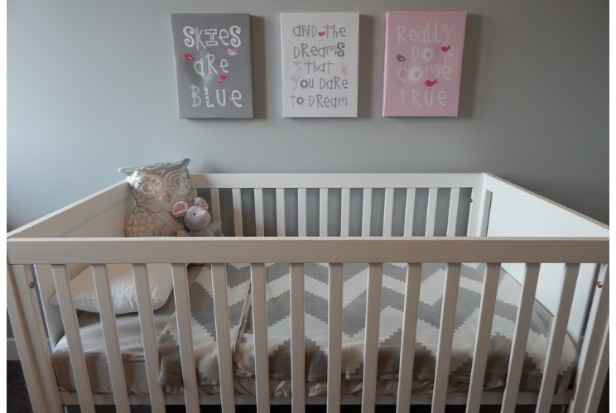There are tens of thousands of baby products on the market, so new parents frequently find themselves having to decide between two options.
Both water wipes and pampers sensitive wipes are often used on people with sensitive skin, but Pampers Aqua Pure is softer and virtually rip-proof.
With a straightforward, unsponsored evaluation of both wet wipes, this comparison of WaterWipes and Pampers Pure is intended to ease your mind.
Let’s compare those lists and see what makes the two different based on my experience raising three children.
Water Wipes Vs Pampers Aqua Pure Wipes Overall

Both of these wipes will perform admirably when applied to common tasks like changing a baby’s diaper or cleaning up after a meal for a baby.
This means that they are really interchangeable in terms of performance, so we’ll have to pay closer attention to some of the smaller details to determine whether one of them will outperform the other. Essentially, what would cause me to choose one over the other if they were both on the table, and which one would I purchase again before the other one?
Water Wipes Have the Better Ingredients List
The Water Wipes unquestionably take first place in this category if you’re looking for the cleanest, safest ingredient list.
When we check the list of ingredients in a baby wipe, we want to make sure there are no chemicals present that could harm our children. This includes cleansers, surfactants, antibacterials, alcohol, chlorine, and other things that are likely to cause irritation and lead to diaper rash or other issues.
In my own experience, staying away from these has prevented diaper rash in my son for thirteen months and counting!
Here’s the full list of all three ingredients in Water Wipes:
- Water
- Grapefruit extract (.01% of the solution)
- Benzalkonium chloride is actually a byproduct of the extraction of grapefruit, not an ingredient. For years, it wasn’t listed and it isn’t required to be because it’s a negligible amount, but there is a trace amount
This ingredient list shows that there isn’t much cause for concern. Although the Benzalkonium Chloride (BZK, BKC, BAC) is a quaternary ammonium compound used as a biocide should generally be avoided, you won’t even be able to measure the exposure. Practically speaking, you’ll find this chemical in much higher concentrations throughout the house than you would have to be concerned with if you continued to use these wipes.
On EWG’s toxicity scale, this product receives a 1 out of 10 (lower is better), indicating that it is extremely safe relative to other baby wipe brands.
As for the Pampers Aqua Pure ingredients:
- Water
- Citric Acid
- PEG-40 Hydrogenated Castor Oil
- Sodium Citrate
- Sorbitan Caprylate
- Sodium Benzoate
- Disodium EDTA
- Bis-PEG/PPG-16 Dimethicone
- Caprylic/Capric Triglyceride
- Xanthan Gum
Undoubtedly, there are many more items on this list, some of which appear to be quite frightening. In actuality, only a handful of ingredients—dimethicone, castor oil, and sodium benzoate—are even remotely concerning. Each of those carries a 3 out of 10 on EWG’s scale of toxicity and the overall product itself receives a 1 out of 10.
Quality and Durability
Like I said before, you won’t find a huge difference between the way these two wipes perform side-by-side as they will both get the job done. However, there are a couple of differences.
When attempting to remove objects from a baby’s bottom with a wipe, Pampers’ has a nicer texture compared to the other brand. It prevents the wipe from slipping in your hand and removes a little bit more debris with each pass. The Pampers seem to be a little more resistant to tearing or other types of wear and tear while in use, in my opinion. However, in order to reach that conclusion, I had to attempt to violently tear apart each one of them one at a time, which isn’t exactly typical use!
Although both of these wipes are fragrance-free, I’ve always preferred the scent that Water Wipes have over much of the competition. Even if the other ingredients in fragrance-free baby products are natural, occasionally they can have an odd, almost chemical smell to them. It must be the tiniest hint of grapefruit because they only have a dab of grapefruit seed extract visible to my nose. I am aware that this may seem petty, but my wife and I have talked about it in relation to baby wipes.
Eco-friendliness
On the basis of their ingredient lists and chemical safety ratings, I would categorize both of these specific wipes as natural baby wipes in general.
Unfortunately, neither the Water Wipes nor the Pampers Aqua Pure are “flushable” or fully biodegradable. Since I never flush wipes, I rarely think about whether they are flushable or not, but I do give a lot of thought to whether they will decompose in the landfill.
The best baby wipes will be made of a fabric that degrades fairly quickly in water and completely decomposes or composts when it reaches its destination. Pampers currently doesn’t carry any biodegradable baby wipes, and Water Wipes has promised to “get there soon” but hasn’t done so.
Check out my top picks in this roundup if you want to see some fantastic natural and biodegradable baby wipe options.
Packaging and Other Little Details

It is easy to find both of these brands in either a big refill bag to use with the cases or pouches that you already own or in the standard 80-count packages with a side dispenser.
For the Water Wipes, the package has an open slit with a plastic covering taped to it rather than a flip-top. They are generally fairly easy to reseal, but it is unquestionably the less durable choice. Also, they are not interlocked inside the packages so you’ll find it hard to grab just one wipe at a time – usually a few will come out together!
A nice plastic flip-top dispenser with interlocked wipes that are simple to pull out comes with the Aqua Pure.
Since you’ll be using so many wipes in the first couple of years, it might not seem like a big deal, and in the end, it doesn’t, but it’s still one of those little things that could annoy you later.
Pampers Aqua Pure Wipes Offer a Better Value
Now that we’ve established that we can reasonably compare these wipes on an apples-to-apples basis, let’s see if the price will sway our decision.
As of the time of this writing, Pampers Aqua Pure are selling for about $0.04 per wipe while Water Wipes are selling for about $.06 per wipe. These prices have stayed pretty consistent since I reviewed both products earlier this year and will likely stay where they are for a while. Accordingly, Pampers are the better option, all things being equal.
As a result, I believe Pampers Aqua Pure triumphs in the contest between Water Wipes and Pampers. Check them out on Amazon here to get the latest price!
Tips for Buying Baby Wipes
When your baby is a newborn, you may prefer just to use plain water with a cloth or cotton wool pad to clean them, but as they grow and when out and about, having wet wipes handy for nappy changes or a quick clean of sticky hands is really helpful.
Wet wipes that have fewer additives and no fragrance may be your first choice if your baby has sensitive skin because they are kinder to the skin of your child.
You may also have wipes you prefer for different situations, your favourite nappy changing wipes maybe thicker, wetter or just cheaper, for example. Many parents are also considering the expanding selection of environmentally friendly products available, including washable cloth wipes and biodegradable wipes. Make sure the packet can be flushed as well. Although toddler wet wipes can occasionally be flushed, baby wipes are frequently not.
What wipes work for you will be different to the next parent, but there are plenty of options on the baby product market.



